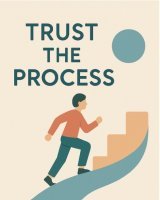Going The Extra Mile
The Power Of One More
Life is non-linear, which makes the rewards of continued effort disproportionately big.

The Context of Going The Extra Mile
The origin of the phrase "going the extra mile" is said to be from the sayings of Jesus in the "sermon on the mount". At that time Palestine was under Roman occupation and a Roman soldier could legally impress a local Israeli citizen to carry his kit bag [weighing about 60kg] for 1,000 steps which was a Roman mile. Jesus was telling his followers to offer to carry the kit bag for a further 1,000 steps. Various commentators have offered differing interpretations as to Jesus's intended meaning.
The modern colloquial use of the phrase suggests making a special effort, going beyond what is expected of you to accomplish something. It is frequently used in the context of customer service.
In this article I want to move beyond the conventional meaning that applies to a one-time action and apply this to the very specific context of the pursuit of a long term goal which require you to go countless extra miles to set yourself up for a long term success.
The Power of One More
There are many motivational books that offer a wide range of
strategies to enable you to make that extra special effort. The latest
to join this illustrious roster is Ed Mylett with "The Power Of One
More".
Mylett's message is that:
“You're a lot closer to changing your life than you think. You’re one
more meeting, one more relationship, one more decision, one more action,
or one more thought from leading the life you deserve.”
He offers 3 "one more" thinking strategies to help you find the strength to take one more swing at a change you’re trying to make.
You can download a free one page summary of these 3 key points from the book courtesy of Nathan Lozeron of Productivity Game.I have no issue with any of this and I think Mylett makes some constructive points.
But in this article I want to address 2 key questions that, like the proverbial elephant in the room, lurk behind these tough and sweat inducing efforts to go the extra mile and unleash the power of one more:
[1] How and why can I have any confidence that it is worth making these continued efforts?
[2] How can I know when "enough is enough" and it's time to bail out?
Going The Extra Mile For Disproportionate Reward
I have found the work of Nassim Taleb particularly helpful in gaining some insight into chance and probability from a statistical perspective with his insights based on his 21 years as a successful quantitative trader.
Linear and Non Linear Systems
Many of the systems in our everyday life move in a linear fashion. So for example, every exam you take at school, university or professional training brings you closer to graduation or certification. Or, every dollar saved and invested in your retirement plan brings you closer to a comfortable retirement.
This is what we are used to and this is what we are brought up to expect.
Taleb explains that the reason why much of life is non-linear is that it is not path dependent - i.e. what has worked before will not necessarily work
again - so if you keep on doing the same things over and over as you
have before it does not guarantee a predictable result. Conversely if you started out at the same point again, with no dependence on what has gone before, you would likely do it differently and get a different result.
We are "hard wired" to expect incremental steps and incremental changes to have only an incremental impact.
But when there is a non-linear relationship between the steps and their impact and, at some unknown and indeterminate point, a tipping point is reached and a significant and often unstoppable effect or change takes place then this makes the rewards of going the extra mile disproportionately big.
Setting yourself up for the disproportionate reward with the long game strategy
The long game describes an approach to any area of life that sacrifices short term gains for long-term wins.
The first step in the long game is the most difficult and negative.
You have to be willing to suffer today in order to reap enormous rewards tomorrow.
Going the extra mile in the
long game is so hard to play because it involves taking a series of very
small steps, that people rarely see, persistently and consistently over
a long period of time to reach an enormous and visible outcome.
Here are 7 proven strategies, with resources, for playing the long game:
- Adopt the Craftsman Mindset
- Attract Luck - Be The Best At What You Do
- Focus On The One Thing
- Benefit From The Power Of Habits
- Compound Your Way To Exponential Growth
- Be Smarter Rather Than Faster
- Live an Antifragile Life
Going The Extra Mile And Knowing When to Bail
In going the extra mile in the pursuit of a long term goal there always comes a point when you will ask yourself whether the pain of putting up with the tough times is worth the benefit of the light at the end of the tunnel.
Here are 3 key factors to take into account:
- Short Term vs Long Term Strategies - Quitting as a short-term strategy is usually a bad idea because it is usually based on subjective and emotional factors.
- When You MUST Bail Out Quickly - However there is an exception to this when you have made a commitment to a new project or job, or a new relationship, and realise very early on that you made a serious error of judgement. In this instance it is a very good idea to bail out quickly before you do yourself and the other party serious harm.
- Why Quitting For The Long Term Matters Most - Quitting for the long term is a better idea because it frees you up to focus on something more beneficial to your long term interests.
The 3 key questions for knowing when to quit:
- How much time are you willing to spend?
- How much money are you prepared to spend/lose?
- How much pain are you willing to put up with?
Further reading:
The Road Less Traveled - In this article I have outlined in some detail many of my own experiences in playing the long game. I have shared what these issues are and how best to deal with them. The article closes with further experience based material to read together with extensive resources.
Embrace Your Fear Of Failure And Uncertainty - Here we explore how success is the exception rather than the rule and put fear of failure into perspective with 2 simple but powerful strategies that I use. These will enable you to embrace your fear of failure and your underlying fear of uncertainty.
Ed Mylett - The Power Of One More
Next Article: Tao Te Ching - How To Be Lived By The Tao
Return from "Going The Extra Mile" to: Walking The Talk
LATEST ARTICLES
How to See Your Thoughts Without Becoming the Story
 A Practical Guide to Thought-Awareness. You can spend your life inside the stories of your mind without ever learning how to see your thoughts clearly and objectively. Most of the stuff we tell oursel…
A Practical Guide to Thought-Awareness. You can spend your life inside the stories of your mind without ever learning how to see your thoughts clearly and objectively. Most of the stuff we tell oursel…The Collison Decision Matrix - A Simple Framework for Better Choices
 The Collison Decision Matrix Is A Practical Everyday Thinking Tool. Most of us spend a surprising amount of time worrying about decisions. From small ones such as what to wear, what to eat, what to te…
The Collison Decision Matrix Is A Practical Everyday Thinking Tool. Most of us spend a surprising amount of time worrying about decisions. From small ones such as what to wear, what to eat, what to te…The Power Of Asking The Right Question
 The Power Of Asking The Right Question Lies In The Quest For Insight. To experience the power of asking the right question you must develop the practice of asking questions. The best way to improve th…
The Power Of Asking The Right Question Lies In The Quest For Insight. To experience the power of asking the right question you must develop the practice of asking questions. The best way to improve th…Site Pathways
 Here is a site pathway to help new readers of Zen-Tools navigate the material on this site. Each pathway is based around one of the many key themes covered on this site and contain a 150 word introduc…
Here is a site pathway to help new readers of Zen-Tools navigate the material on this site. Each pathway is based around one of the many key themes covered on this site and contain a 150 word introduc…How To Live With Contradiction - Beyond Thought Let Stillness Speak
 A major impact on so many peoples' lives is the situational contradiction of unfilled realistic expectations. So where does all this leave us? Well here we are, with mental equipment that is more lim…
A major impact on so many peoples' lives is the situational contradiction of unfilled realistic expectations. So where does all this leave us? Well here we are, with mental equipment that is more lim…How To Trust The Process Of Mindfulness - Right Now
 In mindfulness, the process isn’t some distant goal — it's what is happening right now. When we talk about how to trust the process of mindfulness the credibility of the process is heavily dependent…
In mindfulness, the process isn’t some distant goal — it's what is happening right now. When we talk about how to trust the process of mindfulness the credibility of the process is heavily dependent…Inner Mastery For Outer Impact - Mental Clarity For Effective Action
 Insights only matter if they translate into consistent action. In a world crowded with quick fixes and motivational soundbites, the theme “Inner Mastery for Outer Impact” calls us to something more e…
Insights only matter if they translate into consistent action. In a world crowded with quick fixes and motivational soundbites, the theme “Inner Mastery for Outer Impact” calls us to something more e…The Wise Advocate - Helping You Achieve The Very Best Outcome
 The focus of your attention in critical moments of choice either builds or restricts your capacity for achieving the best outcome. When we talk of 'The Wise Advocate' its easy to think of the consigl…
The focus of your attention in critical moments of choice either builds or restricts your capacity for achieving the best outcome. When we talk of 'The Wise Advocate' its easy to think of the consigl…Trust The Process - Beyond The Cliche
 The phrase "trust the process" has become a cliche, the woo-woo mantra of the "self help" industry. Those three little words feel like they ought to mean something useful but hidden behind them are a…
The phrase "trust the process" has become a cliche, the woo-woo mantra of the "self help" industry. Those three little words feel like they ought to mean something useful but hidden behind them are a…The Dopamine Delusion - Why Anticipation Beats Achievement
 The thrill we feel is not in the having, but in the wanting. The more we have, the more we want. The more things we acquire and the easier things get for us, the more discontent we feel. The more spo…
The thrill we feel is not in the having, but in the wanting. The more we have, the more we want. The more things we acquire and the easier things get for us, the more discontent we feel. The more spo…The Power Of Silence Is Experienced In Your Use Of Language
 Practise the "Beneficial Neurological Delay" for optimal comprehension. The power of silence is experienced in your use of language, specifically: - How you formulate the words you use to think and in…
Practise the "Beneficial Neurological Delay" for optimal comprehension. The power of silence is experienced in your use of language, specifically: - How you formulate the words you use to think and in…Dealing With Setbacks - 5 Questions To Help You Face Discomfort
 How To Counter The Cognitive Shock Of A Setback. Setbacks challenge your instinctual desire for control and comfort, making it unnatural to respond with calm or acceptance. The reason for these instin…
How To Counter The Cognitive Shock Of A Setback. Setbacks challenge your instinctual desire for control and comfort, making it unnatural to respond with calm or acceptance. The reason for these instin…